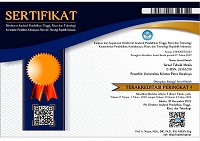Production of Biodiesel through Transesterification of Avocado (Persea gratissima) Seed Oil Using Base Catalyst
Keywords:
Biodiesel, transesterification, avocado seed oil, dry washing.Abstract
Biodiesel is produced through a chemical process called transesterification, which refers to a catalysed chemical reaction involving vegetable oil and alcohol to yield fatty acid alkyl esters (biodiesel) and glycerol as a by product. Biodiesel is petroleum substitution in which its quantity continually decreases due to increasing of demand. Plenty of plants could be used as raw material for biodiesel, for example is avocado (Persea gratissima) seed. This is a waste that being thrown out after the flesh is taken. Therefore, avocado has a higher economic value to be used for consumption. Avocado is not only as an edible commodity but also as feedstock for production of biodiesel. The purposes of this research are producing biodiesel from avocado seed oil (Persea gratissima) so it can be used for alternative fuel, studying the effect of molar ratio avocado seed oil to methanol and reaction temperature to yield the highest methyl ester content, and also studying the effect of washing method and comparing between the conventional method (using water) and dry washing method to reach the highest methyl ester content. Variables that are used in this research are molar ratio of methanol to avocado seed oil, reaction temperature, and washing method. Transesterification process runs for 60 minutes, with NaOH as base catalyst concentration is 1% by weight. Avocado seed oil contains free fatty acid less than 2%, so that transesterification process can be carried out with no addition step to convert free fatty acid content become esters. Crude biodiesel which is yielded from transesterification process still contains of impurities, such as traces of glycerine, unreacted methanol, rest of base catalyst, and soap stock. So it needs to be washed out. There are two washing methods, which are water washing and dry washing. The use of dry washing method is expected to be technically feasible with less complexity than the water washing method, thereby making it a competitive alternative to commercial biodiesel production. From this research, it can be concluded that the characteristic of biodiesel from avocado seed oil is acceptable for alternative fuel. The optimum condition is obtained at molar ratio of 1:6 (alcohol to oil) and temperature 60C. Washing method with water is resulting methyl ester content of 82.7119%, while for dry washing method resulting methyl ester content of 84.5678%. Therefore, the best washing method is dry washing in difference of 1.8559%.Downloads
Published
2010-06-18
Issue
Section
Articles
License
Jurnal Teknik Mesin diterbitkan oleh Universitas Kristen Petra.
![]()
Artikel dan semua materi yang diterbitkan terkait didistribusikan di bawah Lisensi Internasional Creative Commons Attribution License (CC BY).


















